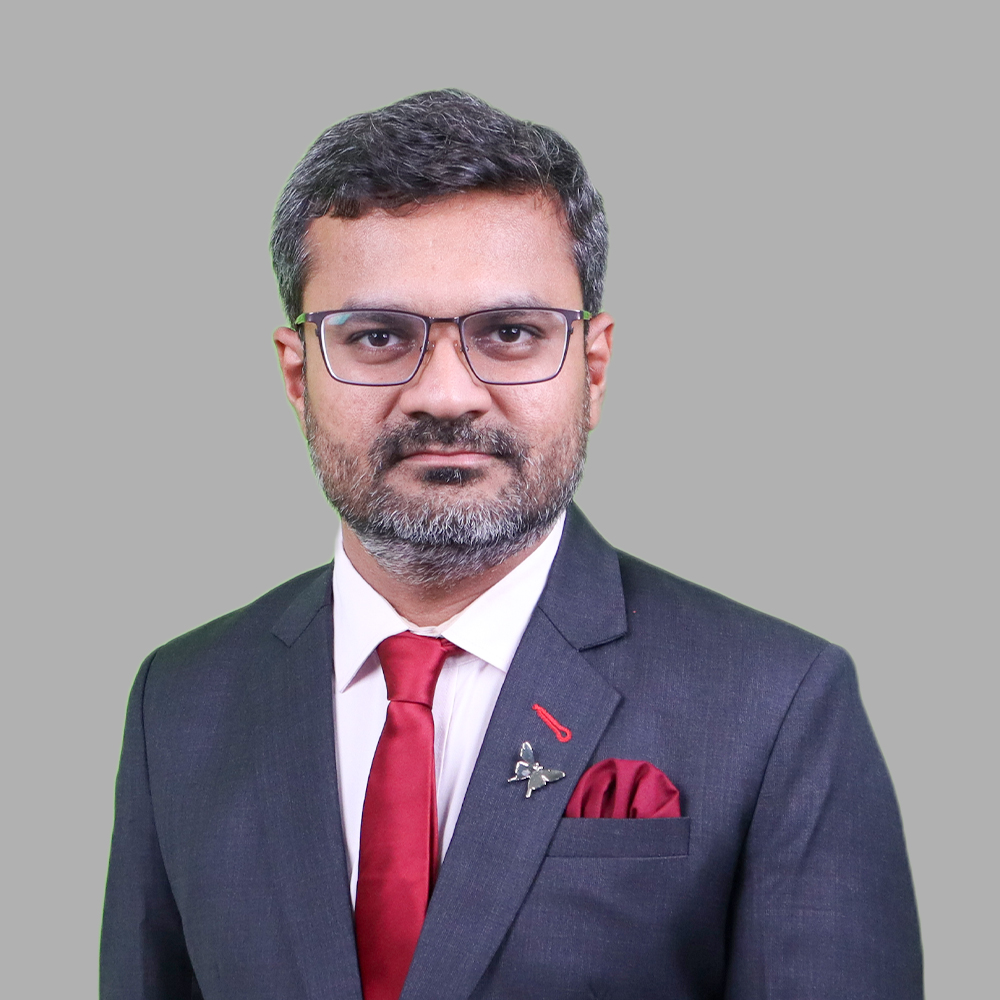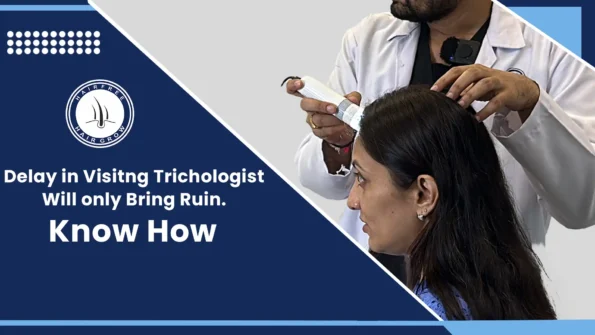We often say that delay is okay, except in serious matters. Delaying has slowly crept into us because we have been told to take it easy and relax, but going against this grain and doing things right now is what can make you perfect and beautiful. Just take the case of hair, if you notice some hair fall or dandruff, you panic and talk to the people close to or near you. Delay in visiting trichologist advice can worsen hair problems and make treatment harder.
What they say can be recorded in these stock replies:
1. Hair Fall is natural, you lose hair everyday and it regrows.
2. Don’t panic you are just overthinking, it!
3. Oh it isn’t a lot you are just imagining it. Doctors will just give you expensive medicine for it.
4. Just use this (or that) oil or shampoo. This will solve everything and you will see results soon.
All of these replies cause you to delay visiting a Trichologist and a Dermatologist for the issue. Every one of these replies can be countered. So the benefits of meeting doctors and solve your hair problems.
What is Trichologist?
A trichologist is a specialized expert who helps with hair and scalp problems. They’re like doctors for your hair and scalp, understanding and treating issues like hair loss, dandruff, and other hair-related concerns. Think of them as the experts who know all about keeping your hair healthy and solving any problems you might have with it.
Difference Between Dermatologist and Trichologist
The main difference between a dermatologist and a trichologist is that a dermatologist is a medical doctor who specializes in the diagnosis and treatment of skin, hair, and nail conditions, while a trichologist is a specialist in the hair and scalp.
Dermatologists have a medical degree and have completed a residency in dermatology. They are trained to diagnose and treat a wide range of skin, hair, and nail conditions, including:
- Acne
- Eczema
- Psoriasis
- Rosacea
- Cancer of the skin, hair, and nails
- Hair los
- Scalp conditions
- Nail disorders
Trichologists are not medical doctors. They typically have a bachelor’s degree or a certification in trichology. Trichologists are trained to diagnose and treat hair and scalp conditions, such as:
- Hair loss
- Dandruff
- Seborrheic dermatitis
- Psoriasis
- Hair breakage and split ends
- Hair damage from chemical treatments or heat styling
- Hair thinning
- Alopecia areata and other types of autoimmune hair loss
- Trichotillomania (hair-pulling disorder)
When To Consult a Trichologist?
You should consult a hair trichologist if you are experiencing any of the following hair problems:
Hair Loss and Hair Fall
If it’s natural hair fall, the doctor’s suggestion will calm you more than your friend’s or family’s reply, because it comes from a medical professional.
If the hair fall in any way is a sign of an underlying condition then the doctor can start the treatment faster and the faster you catch the cause of hair fall, the lesser the damage.
Hair loss can cause serious issues like autoimmune conditions in the case of Cicatricial Alopecia, and psychological issues in the case of Trichotillomania.
Thus getting an opinion early is the best way to go. And it is very important to get a scalp examination half-yearly as we do for other parts of our body. This keeps one’s medical file updated and any hair issue can be pinpointed to a cause relatively easily.
Hair Breakage
Hair breakage can be a distressing issue, often causing significant concern. It’s when your hair strands break easily, resulting in shorter and weaker hair. This can be caused by a variety of factors, such as excessive styling, use of harsh hair products, or even nutritional deficiencies.
Hair Thinning
Hair thinning, another common problem, can affect anyone. It’s a gradual reduction in the volume and density of your hair. Various factors contribute to this, including aging, hormonal changes, and certain medical conditions. A trichologist can help identify the cause and suggest appropriate treatments.
Excessive Dandruff
Dandruff, though common, can become a significant concern when it’s excessive and persistent. It can be embarrassing and uncomfortable. If over-the-counter remedies aren’t providing relief, consulting a trichologist can be beneficial. They can diagnose the underlying cause and recommend a suitable dandruff management plan.
Other Scalp Conditions
Apart from dandruff, there are various other scalp conditions like psoriasis, eczema, or fungal infections that can cause discomfort and affect hair health. A trichologist can accurately diagnose these conditions and propose effective treatments, helping you regain a healthy scalp and hair.
Alopecia and Its Types
1. In the case of Alopecia Areata where hair loss is sudden and in patches, delay can cause Alopecia Totalis where hair is completely lost from an area, or Alopecia Universalise where hair from the entire body sheds in a short time. Both these advanced forms of hair loss are nearly impossible to reverse.
2. Cicatricial Alopecia where there is scarring of the scalp and hair loss happens due to inflammation of hair follicles and causes them to convert into scars, in this case, delay can cause the system to attack more hair follicles resulting in a gradual increase in hair fall.
3. Telogen Effluvium is a type of hair loss that happens in Hair which is in the resting (Telogen) phase. Usually, about 15 to 20% of hair is in the resting phase and if it increases due to shock or fever the resulting hair loss can be for a short time. But if it is allowed to stay without visiting a doctor it can become chronic and lead to longer effect
Similarly in other cases also hair loss of different varieties if isn’t diagnosed early and precisely it can lead to various issues. Thus delaying is not okay and shouldn’t be done in any case, especially not in the case of hair.
Conclusion
Delaying a visit to the trichologist could have detrimental effects on your hair and overall well-being. Taking proactive steps and consulting a trichologist at the earliest signs of trouble can help maintain healthy hair and boost your self-confidence.
Your hair asks for care and we at HairFree and HairGrow provide it. Whatever your doubt we will resolve it. Our doctors diagnose the issues easily and perfectly and have a success of above 98% in Hair Transplant cases. So when you choose HFHG you choose more hair with longer life and better grade.
FAQS
Why should I see a Trichologist for my hair concerns?
Visiting a trichologist is crucial for addressing hair concerns because they are specialists in diagnosing and treating issues related to the scalp and hair. Delaying a visit can worsen the condition and potentially cause irreparable damage to your hair.
What kind of hair problems can a trichologist diagnose and treat?
Trichologists can diagnose and treat various hair issues such as hair loss, scalp infections, dandruff, alopecia, hair thinning, and disorders like trichotillomania. Early intervention is key to successful treatment.
How does delaying a visit to a trichologist worsen hair problems?
Delaying a visit to a trichologist can worsen hair problems by allowing the condition to progress unchecked. Hair issues can exacerbate over time, leading to further hair loss, damage, and even permanent balding if not addressed promptly and effectively.
Can self-treatment or over-the-counter products replace a trichologist’s expertise?
Self-treatment and over-the-counter products may offer temporary relief, but they often fail to address the underlying cause of the hair problem. Trichologists are trained to identify the root cause and provide personalized treatments for effective and long-lasting results.
How does timely intervention by a trichologist benefit my hair’s health?
Timely intervention by a trichologist ensures early diagnosis and appropriate treatment, preventing further damage to your hair. The right treatment plan can promote hair growth, improve hair health, and restore confidence in your appearance.
Are there specific signs that indicate I should see a trichologist urgently?
Yes, signs such as sudden and excessive hair loss, persistent scalp itching, unusual patches of baldness, changes in hair texture or color, and scalp tenderness should prompt an immediate visit to a trichologist to rule out any serious underlying conditions.
Can delaying a trichologist visit impact my overall well-being?
Absolutely. Hair health is closely linked to overall well-being. Delaying a visit to a trichologist can lead to emotional stress, lowered self-esteem, and decreased quality of life due to the visible and psychological impact of untreated hair problems.
How can I book an appointment with a trichologist and what should I expect during the visit?
Booking an appointment with a trichologist is simple and can typically be done through their clinic’s website or by calling their office. During the visit, the trichologist will conduct a thorough examination of your hair and scalp, take a detailed medical history, and recommend appropriate tests or treatments based on the diagnosis.

Written By
Dr. Pankaj Khunt
MD – Ukraine
Dr. Pankaj Khunt is a renowned hair specialist emphasizing timely action for optimal hair health. With expertise in Delay in Visiting Trichologist Advice Will Only Bring Ruin. Know How, he educates patients on preventing complications through early intervention and professional care.
Disclaimer
We’ve made all possible efforts to ensure that the information provided here is accurate, up-to-date and complete, however, it should not be treated as a substitute for professional medical advice, diagnosis or treatment. See Detailed Disclaimers Here.

